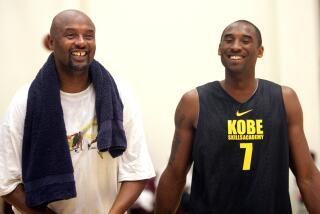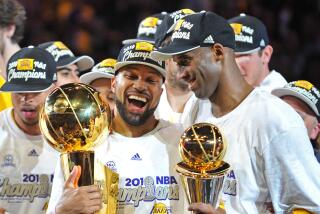Kobe Bryant discovered storytelling as a second act and won an Oscar
After retiring from a basketball career that spanned two decades, Kobe Bryant — an 18-time NBA All-Star who won five NBA championships, two Finals MVPs and one-regular season MVP over 20 seasons with the L.A. Lakers — set his sights on disrupting a new industry: entertainment.
The basketball legend and self-proclaimed Black Mamba, who died Sunday in a helicopter crash in Calabasas at age 41, founded multimedia production company Granity Studios to develop original content that would marry sports concepts with fantasy and storytelling elements. Granity was launched with 12 full-time employees as well as various contractors.
One of Granity’s earliest projects was “Detail,” an ESPN+ series that deconstructed individual NBA playoff performances. The program was written, produced and hosted by Bryant and was intended to teach basketball to others in the same style that legendary NBA assistant Tex Winter once taught him.
“If this show existed when I was 11 or 12 years old, I believe by the age of 21, 22, I would have been a much better basketball player,” Bryant told The Times in 2018. “It’s the grand hope of making basketball better.”
Bryant’s most significant creative success was the animated short “Dear Basketball,” a story based on the poem he wrote to announce his retirement from basketball that earned him an Academy Award, a Sports Emmy and an Annie Award.
Directed by Glen Keane with music by Academy Award-winning composer John Williams, “Dear Basketball” did not have an easy journey to the Oscars, with thousands of people signing a petition demanding Bryant’s nomination be rescinded due to a sexual assault case brought against him in 2003. The case was ultimately dropped and later the subject of a civil settlement.
While the petition didn’t stop his Oscar nomination and subsequent win, it did result in his removal as a juror for the 2018 edition of the Animation Is Film Festival.
“This decision further motivates me and my commitment to building a studio that focuses on diversity and inclusion in storytelling for the animation industry,” Bryant said in a statement at the time. “I remain focused on changing the world in positive ways through diverse stories, characters and leadership in order to inspire the next generation.”
In a 2017 interview with The Times, Bryant said he’d sought out Williams for advice and for a selfie with the composer to show his daughters.
“As a basketball player, what I found myself doing a lot was essentially conducting a game,” he said. “I wanted to talk to [Williams] about how he composed music and try to find something similar that I can then use to help my game as a leader and winning championships.”
Despite his Oscar win, Bryant was denied membership in the Academy of Motion Pictures Arts and Sciences.
Bryant’s love of storytelling was stoked at an early age. Though he wasn’t an avid reader as a kid, Bryant took creative writing classes at Lower Merion High School near Philadelphia. Instead, he watched “Harry Potter,” “Star Wars” and Disney movies to study character and story development and eventually used what he learned to launch a young adult fantasy series of his own.
In 2015, Bryant initiated and executive produced the Showtime documentary “Kobe Bryant’s Muse,” which detailed the highs and lows of his career.
“I didn’t want to write a book — I don’t have the patience to do that,” Bryant told The Times in 2015. “We wanted to create something really different, very truthful. Cinematically, we wanted to do something that would be different from the ways documentaries are shot. This was about doing something that was fun but also honest.”
Last year, Bryant oversaw production of “The Punies,” three YA novels written by fantasy authors and set in a fictional universe where nothing besides sports is real. He also produced a “Punies” kids and family podcast that sought to teach life lessons through melodies and sports and oversaw the Showtime documentary “Muse.”
“What I love is storytelling,” he told Sports Illustrated in 2018. “I love the idea of creative content whether it’s mythology or animation, written or film, that can inspire people and give them something tangible they can use in their own lives.”
More to Read
The biggest entertainment stories
Get our big stories about Hollywood, film, television, music, arts, culture and more right in your inbox as soon as they publish.
You may occasionally receive promotional content from the Los Angeles Times.











